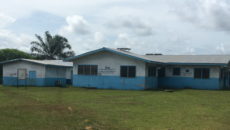MONROVIA, Montserrado – HIV/AIDS advocates in Liberia are warning of a shortage of antiretroviral drugs, which help slow the rate at which the virus multiplies itself in the body.
The executive director of Stop AIDS in Liberia, Stephen McGill, recently sounded the alarm that management issues and bureaucracy have created a shortage of drugs at treatment facilities in the country.
McGill, who is directly affected by the stockout as a person living with HIV, said the situation is causing panic among people living with the virus as they depended on the drugs to survive.
Two officials of the Liberia Women Empowerment Network, a network of women living with HIV/AIDS, also told The Bush Chicken in an interview that the stockout has existed since the end of December 2017.
LIWEN’s program officer, Edith Zoegar, said it is first time a stockout of antiretroviral drugs has lasted for such a long period, since she herself tested positive for the virus in 2009.
Zoegar also disclosed that during her recent tours to parts of the country, it was established that the situation was the same at different antiretroviral therapy clinics in the counties.
“I am a person living with the condition, so when I go, I don’t take it for joke, because I am going through it right in Monrovia. There is no single drug in the clinics,†she said.
Although the antiretroviral drugs do not cure AIDS, they are key to extending the lifespan of individuals living with the virus.
The LIWEN program officer said stopping a treatment which has already started can cause the virus to overmultiply in the body, which may lead to early death.
She said the current situation is also affecting children living with the virus, as antiretroviral syrups meant for them were also not available.
“They are now being served with tablets that are meant for adults, without conducting any form of test to determine the effects,†she noted.
She explained that at the John F. Kennedy Memorial Hospital where she receives her medication, patients are often told that the drugs were in the country but were not available at the facility.
Facilities are complaining that they are requesting the drugs, she said, but supplies were not coming forth.
She added that because of the stockout, some facilities were substituting the antiretrovirals with other medications, a change, which she said has led her to suffer from side effects such as severe diarrhea. Moreover, she said her health had deteriorated.
Zoegar said the last time she ever got her prescribed medication was through a friend who took the same drugs. She is calling on stakeholders to help find a solution to the stockout and save the lives of the estimated 43,200 Liberians living with HIV/AIDS.
LIWEN’s finance officer, Cecelia Cole, described the situation as a complete setback to people living with the virus who have accepted their condition and signed up for the medication as a means for surviving.
She said the lack of available treatment has made it difficult for LIWEN to do its job of encouraging others to accept their conditions when they are tested positive. She described a deep frustration within the HIV community, causing some to give up and forget about treatment.
At the ELWA Hospital, Administrator James Garway did not deny or confirm the shortage of the drugs at the hospital, which is one of the several treatment centers in the country.
Garway told The Bush Chicken he could not provide a definite response on the situation because according to him, both the pharmacist and the personnel in charge of the program at the facility were not available at the time.
Chinnie Sieh who runs Home of Dignity, a private chronic care treatment center for HIV, tuberculosis, hypertension, and cancer, confirmed that for the last three to four months, getting antiretroviral drugs from the National Aids Control Program has become a real challenge for the treatment center.
She said despite exhausting all the protocols involved in filing in requisition for the medication, only a single can of drugs was recently delivered to Home of Dignity, which she said cannot be served to any patient because it is an incomplete dose.
To access HIV treatment drugs for her patients, some of whom have progressed to having AIDS, Sieh said it requires making a requisition to the County Health Team, which she later takes to the Supply Chain Unit of the Ministry of Health, before taking it to the National Aids Control Program and onward to the National Drugs Service.
“Before, it took up to three weeks to process a requisition, but now it has got to be even more longer than expected,†she explained.
She said while the actual reasons for the prolonged delay is yet to be explained, unofficial information gathered indicates that the relocation of the Central Medicine Store, formerly the National Drug Service, to the Freeport of Monrovia was a major contributing factor. Currently, she said all the patients at her center are unable to access medication.
According to her, there are currently 28 patients at her facility who have already failed on the first line of the drugs, and now on the second stage, which indicates that they have reached the last stage that the country can treat because of the virus level.
She feared that the patients and their children “have no hope.â€
“Even the ones we have admitted, we are just treating them for other conditions, but we can’t help them when it comes to the [antiretrovirals],†she said.
The Liberia Network of Persons Living with AIDS, also known as LIBNEP+, which aims to seek the welfare and provide support for people living with HIV in the country, has said that despite several attempts to engage stakeholders, officials have not disclosed the cause of the stockout.
The organization issued a press release that said although the National Aids Control Program has since promised to ensure that issues leading to the stockout were addressed, nothing has been done to address the situation.
The group also accused authorities at the Central Medicine Store, which is responsible for delivering HIV-related medical supplies to government facilities, of refusing to grant them audience in a quest to understand reasons for the stockout of the drugs.
However, the network noted that it was able to access a recent memorandum of understanding signed between the Central Medicine Store and a group identified as CHEMONICS for the distribution of HIV medications. Â LIBNEP+ says the new agreement likely created several barriers in the supply chain and is causing the prolonged stockout.
In the absence of government action, LIBNEP+ is calling on the international community and donor agencies to launch a quick investigation in the matter to save lives.
“The lack of timely availability of HIV-related medication in the country will undermine adherence and also cause serious national HIV-related deaths and or HIV resistance string, causing HIV-connected national disaster,†the group disclosed in a release.
HIV treatments are procured through the support of the Global Fund to Fight AIDS, Tuberculosis and Malaria. The fund is coordinated in Liberia by the Liberia Coordinating Mechanism.
LCM’s communications director, Solomon Watkins, told The Bush Chicken that the body was aware of the drug stockout and said plans were underway to address the situation.
Efforts to contact CHEMONICS and the Central Medicine Store were unsuccessful. When contacted, the National Aids Control Program’s director, Dr. Julia Garbo, refused to comment on the matter, but referred The Bush Chicken to the Ministry of Health.
The Health Ministry’s communications director, Sorbor George, noted in a press release that National Aids Control Program has continued to show a great deal of concern and sensitivity to people living with HIV.
He said there were sufficient drugs for people living with HIV are in the country, but they were currently in the warehouse at the Freeport of Monrovia. He, however, did not mention reasons for the continuous stockout of the medications.
“Efforts are being made along with the management of the [National Drug Service] and the USAID-funded agency to access the drugs from the port, although there are some bottlenecks,†he noted.
He acknowledged the concern that people living with HIV must be on the drugs continuously for life, but asked that they remain patient, as everything was being done to provide the supplies in the shortest amount of time.
According to a National AIDS Commission report, the number of people living with HIV in Liberia grew to 43,200 in 2017, from a previous figure of 33,000.
Liberia has expressed a commitment to achieve the universally desired goal of zero new HIV infections by 2020. With the current prolonged stockout of antiretroviral treatments, officials of the Liberia Women Empowerment Network say the country may not achieve the goal.
Featured photo by NIAIDS



